I researched VPN renewal prices – and the results aren't pretty
How much will your VPN auto-renew for and how do you stop it?
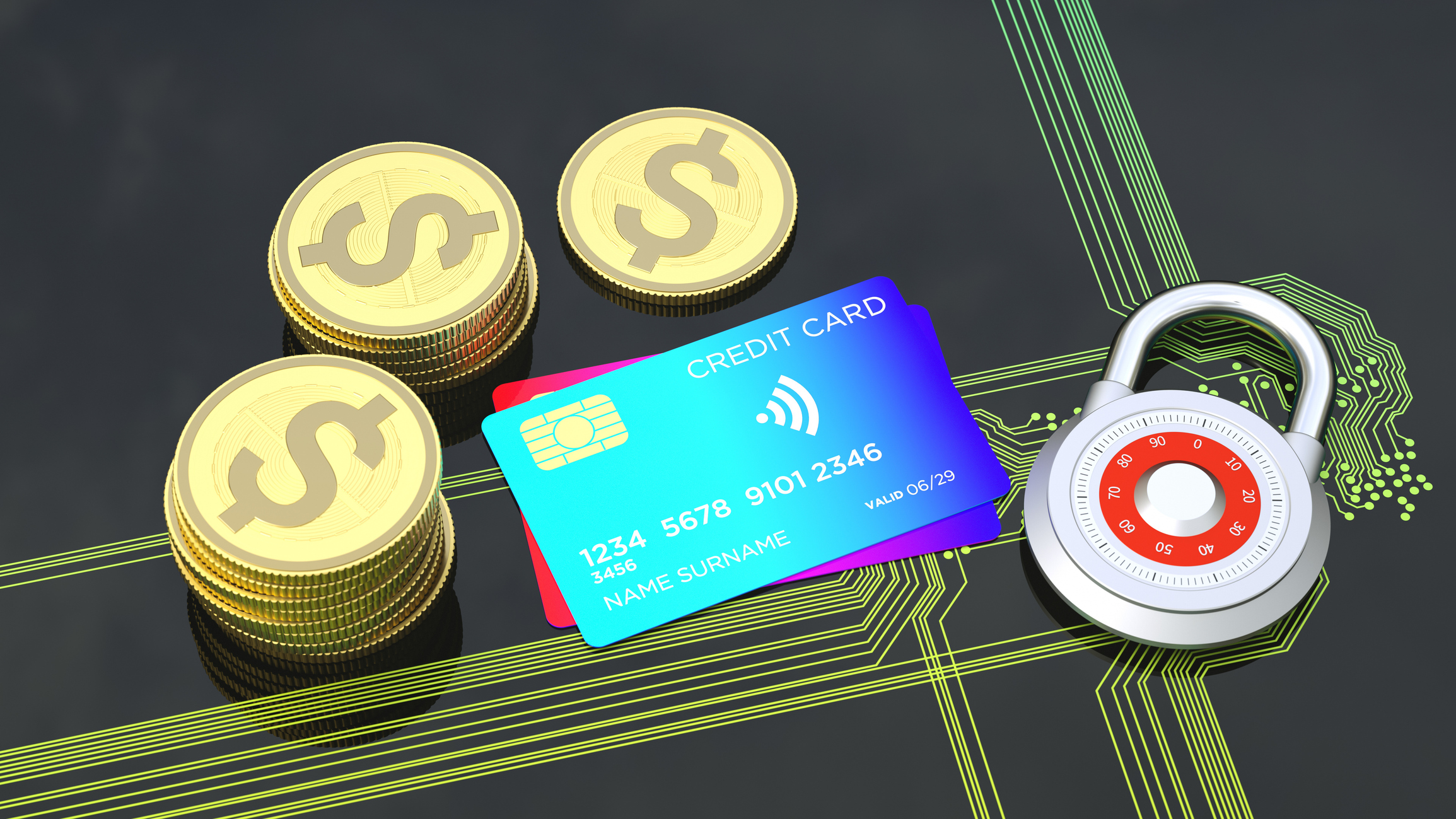
Like many subscription service industries, most VPN companies offer cut-price deals to entice you in – but these are almost universally "introductory rates". When your plan runs out, you'll automatically pay a "renewal rate," which invariably works out at more than what you originally signed up for.
To make matters worse, these renewal rates are often buried in the small print, and it's one of the worst aspects of the industry I work in. That's why it's something I always highlight in my VPN reviews.
Many customers get stung by auto-renewal. Recently, some have gone so far as to file class-action lawsuits against, specifically, NordVPN for "deceptive" practices around these price hikes, the difficulty of switching off the renewal function, and even how hard it is to cancel a subscription.
Of course, an increase in price after an introductory deal is almost standard practice when it comes to subscription services of any kind. However, the combination of VPN prices being advertised at a per-month rate, despite being billed upfront, and the lack of transparency when it comes to how much you'll be charged upon renewal can lead to confusion.
To help make this clearer, I thought I'd rank some of the top-rated VPNs in terms of how much prices are hiked, and how clear this is made when you sign up.
Spoiler alert: it's not pretty.
The prices used on this page are those available to Tom's Guide readers who click through to the VPN websites via one of our affiliate links. These may differ from those available if you head to the site directly. However, the increased renewal rates apply to all subscribers. Most VPN brands have also contributed a comment to this article on their pricing strategy.
Methodology: a note on this auto-renewal comparison
Per-month VPN prices often fluctuate when "free" extra months are added and taken away from the introductory deals, but the total costs of the products remain largely the same.
I've used per-month VPN prices to contrast the differences between the introductory offer and the auto-renewal price, but I've also included those total costs to be clear.
That said, it's important to bear in mind the term of contract. With the exception of Mullvad, all of the VPNs below auto-renew for a 12-month period, regardless of the length of time you signed up for in the first place.
So, while you might have got an introductory offer on a 2-year term, upon renewal you'll switch to a 1-year term once that initial subscription expires.
The point here is that, realistically, you should be expecting to pay more per month on a shorter term like this.
For that reason, I've also included a like-for-like comparison of the discounted 1-year plan and the renewal rate as well. This is a "fairer" comparison, although perhaps less realistic as fewer people pick the 1-year plan over the 2-year plan.
Equally, I've chosen to headline each VPN provider's auto-renew price hike based on the percentage increase of its most popular plan, i.e. the basic VPN tier, at 2-year term.
NordVPN – 241.89% price hike
Subscription tier | 1-month price | 1-year price | 2-year price | Renewal price | Renewal % increase over 1-year plan | Renewal % increase over 2-year plan |
|---|---|---|---|---|---|---|
NordVPN Basic | $12.99 | $4.99 per month ($59.88) | $2.99 per month ($80.73) | $11.59 per month ($139.08, 12 months) | 132.26% | 287.63% |
NordVPN Plus | $13.99 | $5.99 per month ($71.88) | $3.89 per month ($105.03) | $14.99 per month ($179.88, 12 months) | 150.25% | 285.35% |
NordVPN Complete | $14.99 | $6.99 per month ($83.88) | $4.89 per month ($132.03) | $18.29 per month ($219.48, 12 months) | 161.66% | 274.03% |
NordVPN Prime | $17.99 | $8.99 per month ($107.88) | $6.89 per month ($183.03) | $30.99 per month ($371.88, 12 months) | 244.72% | 349.78% |
NordVPN's initial rate is excellent value. However, it's also the most egregious of the top VPN providers when it comes to inflated renewal rates.
With a monthly increase of 287.63% compared to the 2-year Basic plan, if you allow NordVPN to charge you its automatic renewal rate you'll pay well over three times as much per month compared to when you signed up.
In fact, the NordVPN Basic renewal price works out at only $1.40 per month less than going for the most expensive Basic plan, the one-month rolling subscription.
It doesn't stop there. When you start to move up tiers, NordVPN begins to charge you more on renewal than you would pay should you subscribe to the equivalent level monthly rolling plan.
So, should you sign up for the top-tier Prime plan and let it auto-renew, you'll be paying a huge 349.78% more per month than the 2-year deal. Working out an eye-watering $30.99 per month, it's almost twice as expensive as the equivalent monthly rolling plan – plus the fact you pay for a whole year upfront.
It's not hard to see why this is one of the biggest issues you'll see raised online about NordVPN. If you still want to sign up, jump down to our section on how to avoid VPN renewal charges.
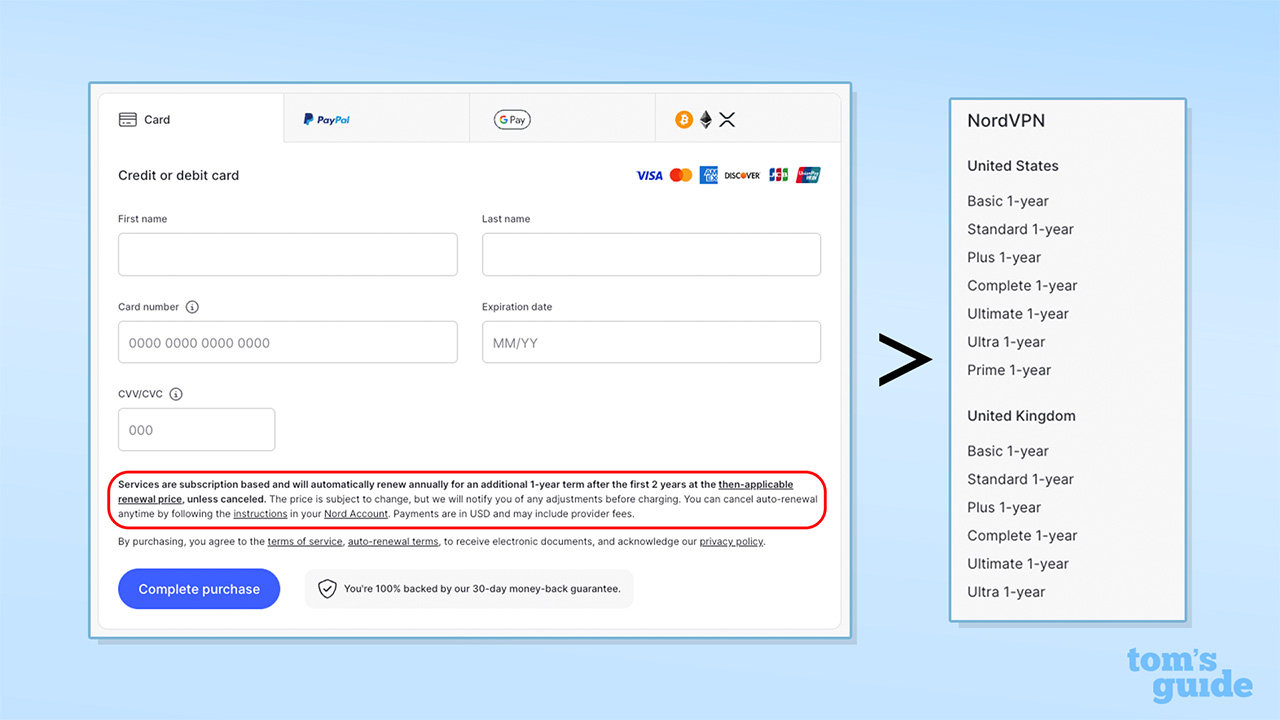
In terms of transparency, NordVPN makes you work to find out how much you'll be paying on renewal when you sign up. Instead of displaying clearly and near the introductory offer, it makes you click through to the payment screen, and then to a separate page outlining the charges.
In my opinion, this extra layer of removal is poor form.
NordVPN isn't unique here – as you'll see – but it is one of the worst offenders of the VPNs that I investigated for this article.
NordVPN's response
I spoke to NordVPN about its pricing, and a spokesperson stated:
"NordVPN does offer a significant discount for new users during the first term. That said, we always aim to be clear about what happens after that initial period. All our customers get a reminder at least 30 days before their subscription renews, and that email includes both the upcoming price and the renewal term. We want to give people enough time to make an informed choice – whether that means continuing, switching plans, or canceling.
"While the jump from our introductory rate to our standard pricing can seem large, mainly because the initial price is heavily discounted, we offer a number of different pricing options to meet different customer needs. Our customers can also choose monthly subscriptions – their price always remains the same."
Surfshark – 230.65% price hike
Subscription tier | 1-month price | 1-year price | 2-year price (+3 months "free") | Renewal price | Renewal % increase over 1-year plan | Renewal % increase over 2-year plan |
|---|---|---|---|---|---|---|
Surfshark Starter | $15.45 | $3.19 per month ($47.85) | $1.99 per month ($53.73) | $6.58 per month ($79, 12 months) | 106.27% | 230.65% |
Surfshark One | $17.95 | $3.39 per month ($50.85) | $2.19 per month ($67.23) | $8.25 per month ($99, 12 months) | 143.36% | 276.71% |
Surfshark One+ | $20.65 | $6.09 per month ($91.35) | $3.99 per month ($107.73) | $9.92 per month ($119, 12 months) | 62.89% | 148.62% |
Perhaps unsurprisingly, fellow Nord Security-owned Surfshark is just behind with the second-highest monthly equivalent increase on renewal.
The Starter plan's renewal rate of $6.58 per month ($79 all-in) isn't as brutal, but it's a massive jump from Surfshark's rock-bottom introductory pricing. We still rate Surfshark as the best cheap VPN, but it doesn't stay that way unless you're savvy with your subscription.
The One plan sees an even higher price inflation upon renewal, but the One+ plan – which includes separate personal data removal service Incogni – isn't quite as savage with its hike. That said, though, it's still more than twice as expensive as the introductory rate.
Despite all this, Surfshark still has the second-cheapest total annual renewal rate overall of all the VPNs on this page, which is something we can commend it for.
To keep hold of that super-low introductory pricing, though, head down to our dedicated section on the topic.
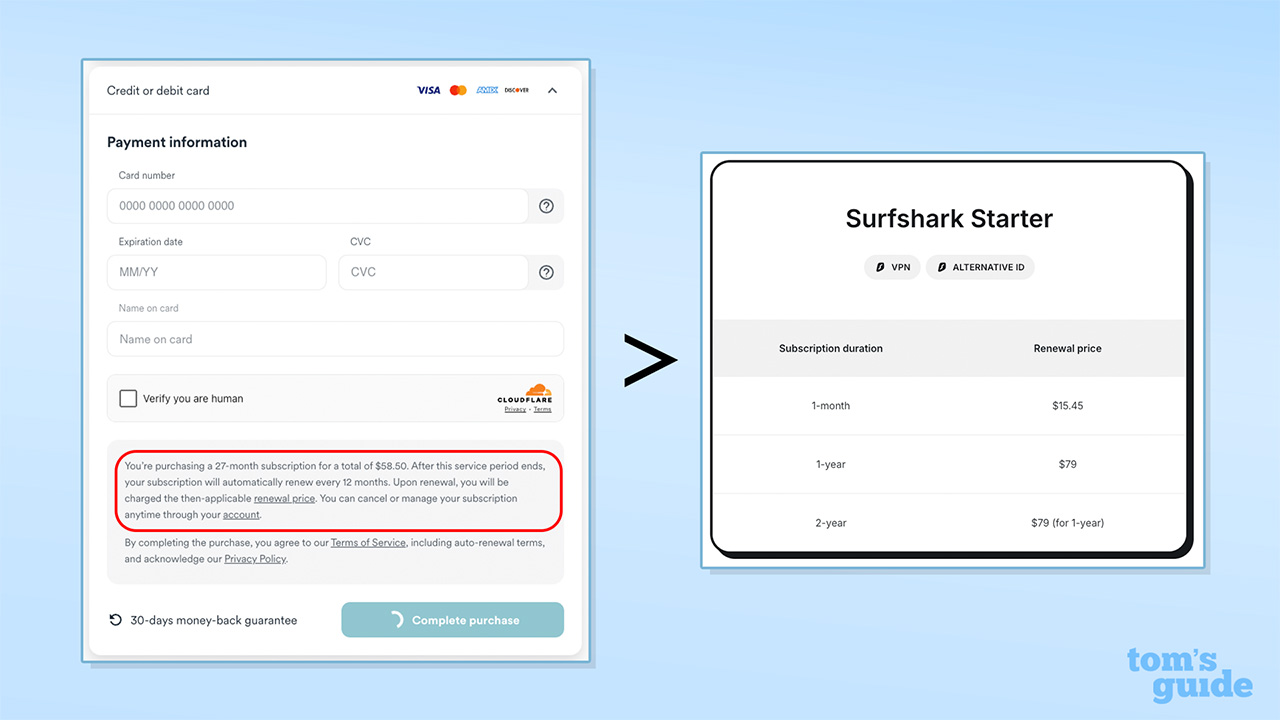
Just like NordVPN, Surfshark makes you jump through hoops to find the renewal prices – you click through to the payment screen, and then on to another dedicated page that opens in a separate tab.
And, just like NordVPN, I think Surfshark could do better here.
Surfshark's response
When I contacted Surfshark, a spokesperson stated:
"At Surfshark, we prioritize transparency around renewal pricing to ensure our users are always well-informed. Our pricing structure is clearly outlined and accessible on the pricing page of our website upon purchasing our services. Users can also access information about their upcoming subscription renewal date and price at any time through the subscription tab in Surfshark's web app. Additionally, we send an email notification one month before the renewal charge occurs.
"We offer a special onboarding deal for long-term plans at signup, providing users with an opportunity to test our services and evaluate whether they meet their long-term needs. This reduced introductory rate is designed to ensure that as many people as possible can affordably try out a top-tier security product.
"The standard price that applies after the initial term reflects the true value of the service and the quality we deliver, and our 30-day money-back guarantee allows users to request a refund 30 days after their renewal charge occurs. Users also have the option to manually purchase a new promotional plan before their current subscription expires and have it applied to their account."
ExpressVPN – 133.27% price hike
Subscription tier | 1-month price | 1-year price (+3 months "free") | 2-year price (+4 months "free") | Renewal price | Renewal % increase over 1-year plan | Renewal % increase over 2-year plan |
|---|---|---|---|---|---|---|
ExpressVPN | $12.95 | $6.67 per month ($99.95) | $4.99 per month ($139.72) | $11.64 per month ($139.72, 12 months) | 74.51% | 133.27% |
ExpressVPN is well-known as a premium VPN option, and bundles a huge amount of extra features with its VPN for a relatively high price. If you need them, it's great value. If you don't, it's expensive – and there are no lower tiers of subscription to choose from.
ExpressVPN charges the customer the same upfront price when it auto-renews, but this time you only get 12 months of service instead of 28 – making it more than twice as expensive.
Compared to NordVPN's and Surfshark's even greater price hikes, it's not too bad. However, ExpressVPN's inflated renewal price is still the equivalent of $11.64 per month – higher than the renewal rates of all the bottom tier plans on this page – so it's hardly a bargain.
Check out our tips below on how to save money when renewing your VPN if you don't want to end up getting scalped.
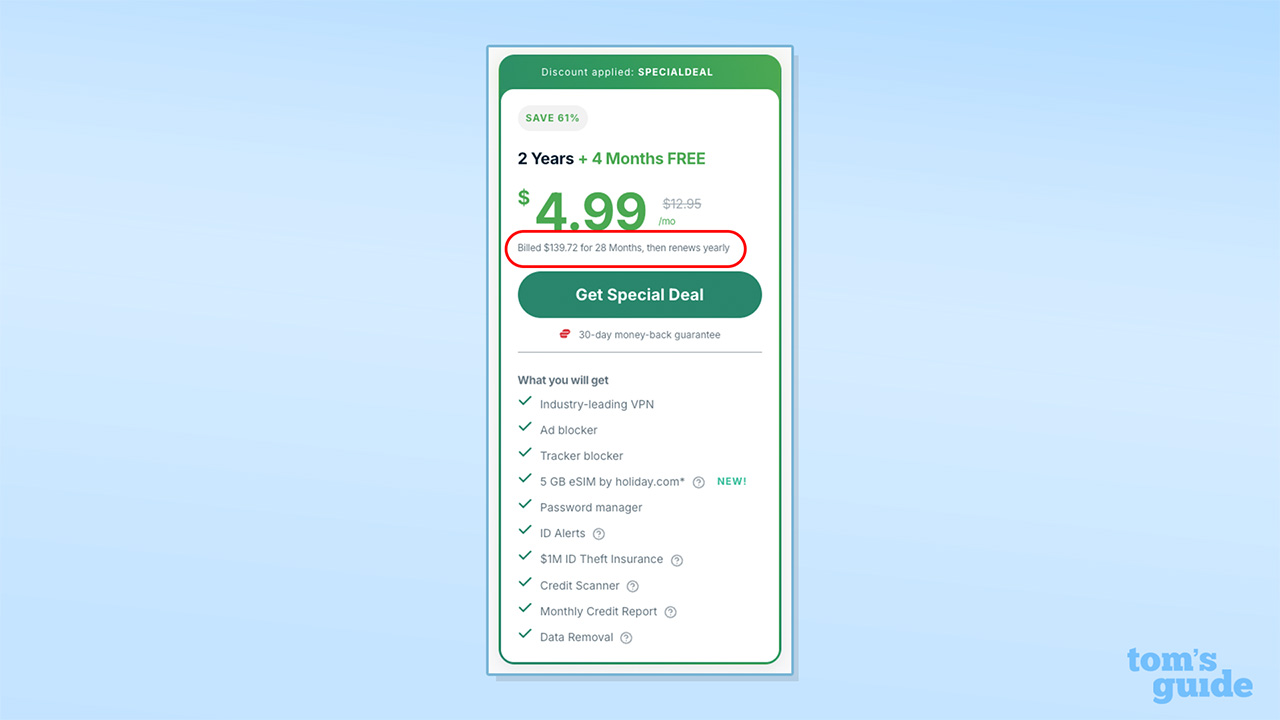
Despite the high price, I think that ExpressVPN is the most transparent of all the VPNs on this page when it comes to disclosing its price increases. With text – albeit very small – located right by the headline price, it's unlikely to be missed, and we commend it for that.
This is how I think these price hikes should be handled – no hiding of the facts. If a company insists on charging more on renewal, at least be open about it.
ExpressVPN's response
In statement to Tom's Guide, a spokesperson for ExpressVPN states:
"ExpressVPN is absolutely committed to both the privacy and security of our users, and providing clear value for money in the products we offer.
"Our longer-term plans offer the best value, and we are proud to be transparent and upfront about how our pricing and auto-renewal terms work at each stage of the checkout process – namely, at the displayed price, and also prominently above the “Join Now” payment button at the checkout.
"Our application, under the ‘account’ tab, also has a live ticker showing users exactly how much time remains on their subscriptions. Additionally, via the ‘My Account’ page, users are given clear and easily accessible options to turn this off manually."
Private Internet Access – 116.89% price hike
Subscription tier | 1-month price | 6-month price | 2-year price (+2 months "free") | Renewal price | Renewal % increase over 6-month plan | Renewal % increase over 2-year plan |
|---|---|---|---|---|---|---|
Private Internet Access | $11.99 | $7.50 per month ($45) | $2.19 per month ($56.94) | $4.75 per month ($56.94, 12 months) | -36.67% (better value) | 116.89% |
Private Internet Access comes out with a relatively high monthly increase of 116.89% on renewal. That's largely down to the bargain introductory pricing of just $2.19, though.
As with ExpressVPN, the total auto-renewal cost is the same as your initial outlay but, again, the second time around you only get a year of service instead of the initial 2-year arrangement. The difference is that, at $56.94, if you do forget to stop it auto-renewing, it's not going to sting anything like as much.
There's no point in paying more than you need to, so check out my advice on how to save when renewing your VPN below.
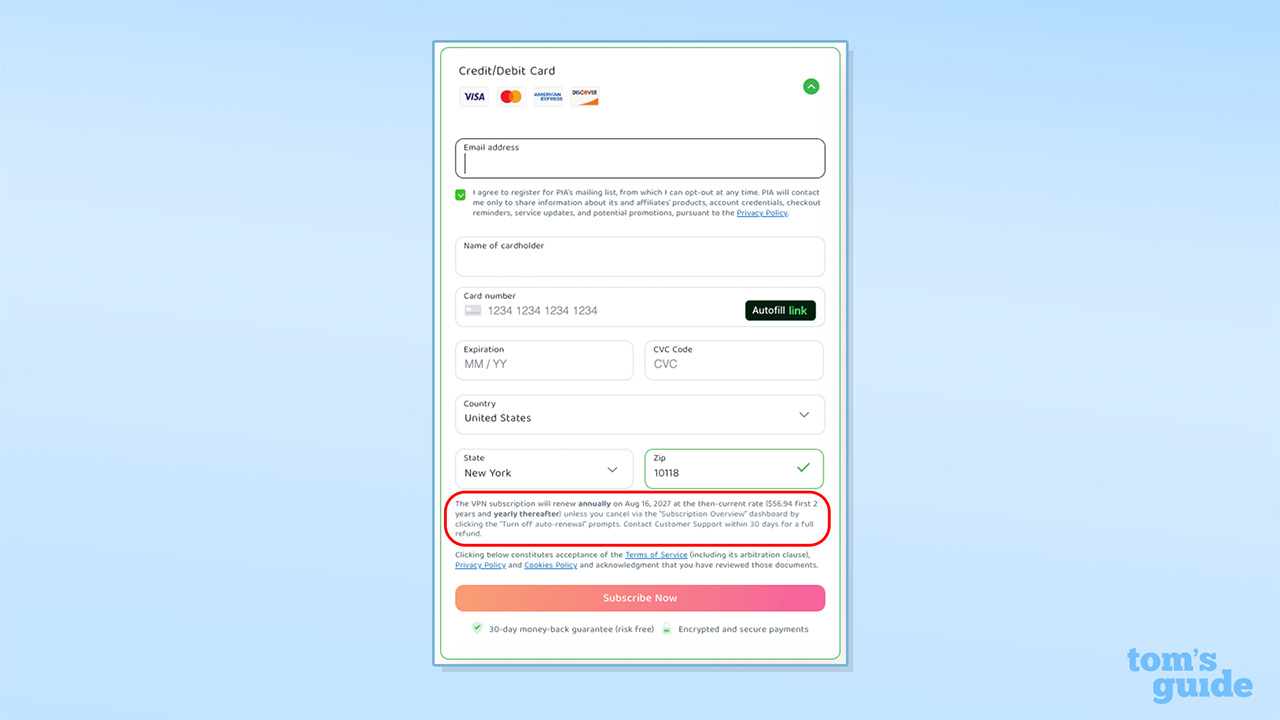
PIA isn't perfect for transparency. There is no mention of any price hikes until you head to the payment screen – but at least it doesn't make you seek out the information from somewhere else on the website.
I'd appreciate it if this disclaimer was presented on the main pricing page, but I can live with this.
Private Internet Access' response
A PIA spokesperson stated:
"The autorenewal wording for PIA is clear and present on the checkout page.
"For a small number of users, the offer selection page, which precedes the checkout page, is designed differently. We appreciate the feedback and will move quickly to bring more consistency to that display. Importantly, the renewal wording for all users is prominently displayed at checkout, via clear and visible text above the 'Subscribe Now' button.
"Transparency is at the heart of what Private Internet Access stands for. While we can’t offer our banner deals in perpetuity, our users are always able to take out a new deal at the point of renewal should they choose."
Proton VPN – 85.52% price hike
Subscription tier | 1-month price | 1-year price | 2-year price | Renewal price | Renewal % increase over 1-year plan | Renewal % increase over 2-year plan |
|---|---|---|---|---|---|---|
Proton VPN | $9.99 | $3.99 per month ($47.89) | $3.59 per month ($86.11) | $6.66 per month ($79.95, 12 months) | 66.92% | 85.52% |
Proton VPN is the first VPN on this page that manages to keep its renewal rate below double the initial monthly price.
You're still paying a fair amount more when worked out per month, but it doesn't feel as predatory – and the fact I'm praising this shows how gaslit I've been by the VPNs above to make it seem like this is an acceptable thing to do.
Working out at $6.66 per month, it's still more expensive than almost all other VPNs cost on their introductory deals, so it's definitely worth taking a look at how to save money when renewing your VPN.
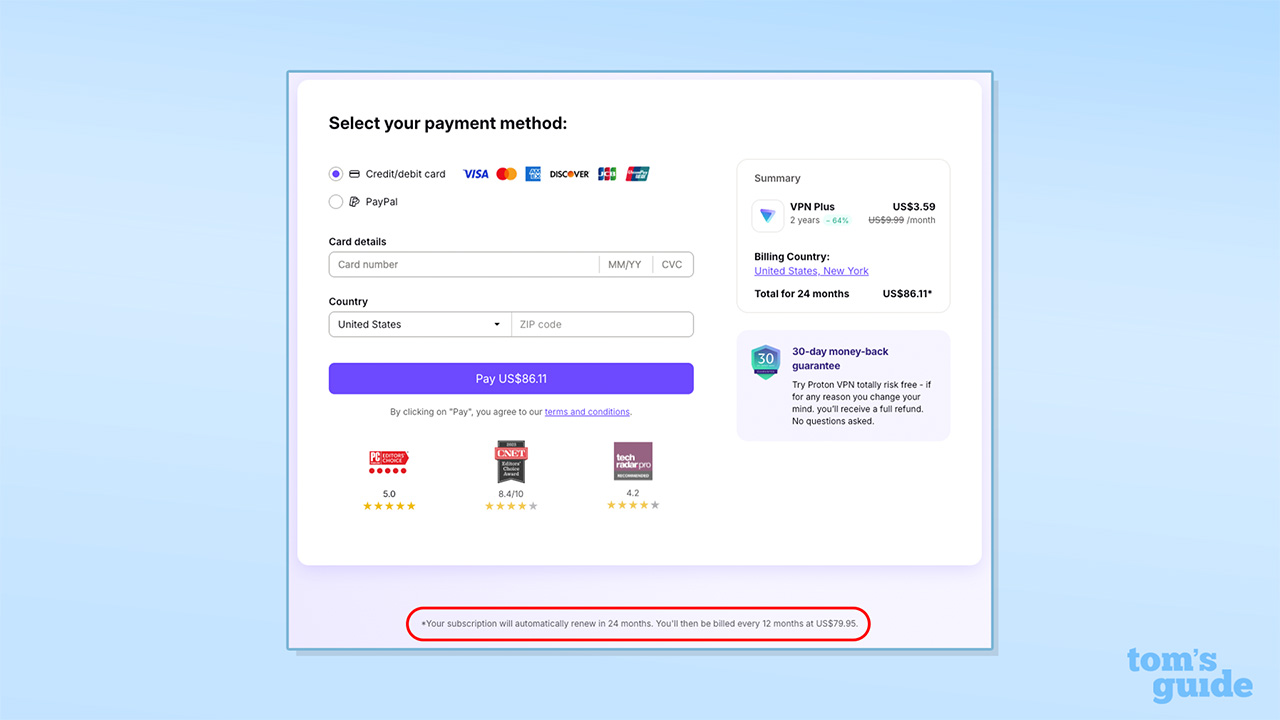
Just like Private Internet Access, Proton VPN makes you wait until you've clicked through to the payment page – and also positions the disclaimer text in the least accessible position possible.
This isn't as bad as NordVPN or Surfshark, but it could be clearer.
Proton VPN's response
I spoke to David Peterson, General Manager of Proton VPN. He stated:
"We would like to highlight that we aim to be as transparent as possible with our pricing. On our pricing website, and through the purchasing process we display the term for which any introductory discount may apply, and what it will be the following year. Importantly as well, for the EU, UK, Australia and others where relevant, we show all our prices as VAT inclusive so that users aren't surprised by sales taxes after the fact.
"Within each customer's account, we show the amount to be billed in the following subscription cycle, and the billing date – and this can be cancelled by the subscriber at any point. We also have a very straightforward 30 day money back guarantee for those who aren't wholly satisfied with our service. As our audience changes over time, we're constantly improving our communications to meet customer needs.
"Aside from the introductory discounts, we generally avoid price increases for existing customers. We aim to keep users at old price points, or only increase prices in line with increases to our cost base – not as a profit-making exercise."
Mullvad – 0% price hike
Subscription tier | 1-month price | 1-year price | 2-year price | Renewal price | Renewal % increase over 2-year plan |
|---|---|---|---|---|---|
Mullvad | $5 | $5 per month ($60) | $5 per month ($120) | $5 (1 month) | 0% |
While Mullvad has a few limitations that mean it can't quite compete with the providers above for everyday use – namely, unblocking streaming sites – it's widely regarded as one of the most private VPNs. This integrity carries through to its pricing model, which is refreshingly fair.
Whether you want to sign up for a month or a year, you'll always pay just $5 per month (working out at $60 per year). On the face of it, this seems quite expensive when compared to the likes of Surfshark. However, when put side-by-side with renewal pricing, only Private Internet Access remains better value.
Although it's never going to happen, I'd love it if every VPN was as straightforward and easy to understand as Mullvad.
I invited Mullvad to respond but have not heard anything back. It seems the Swedish brand is happy to let the numbers speak for themselves.
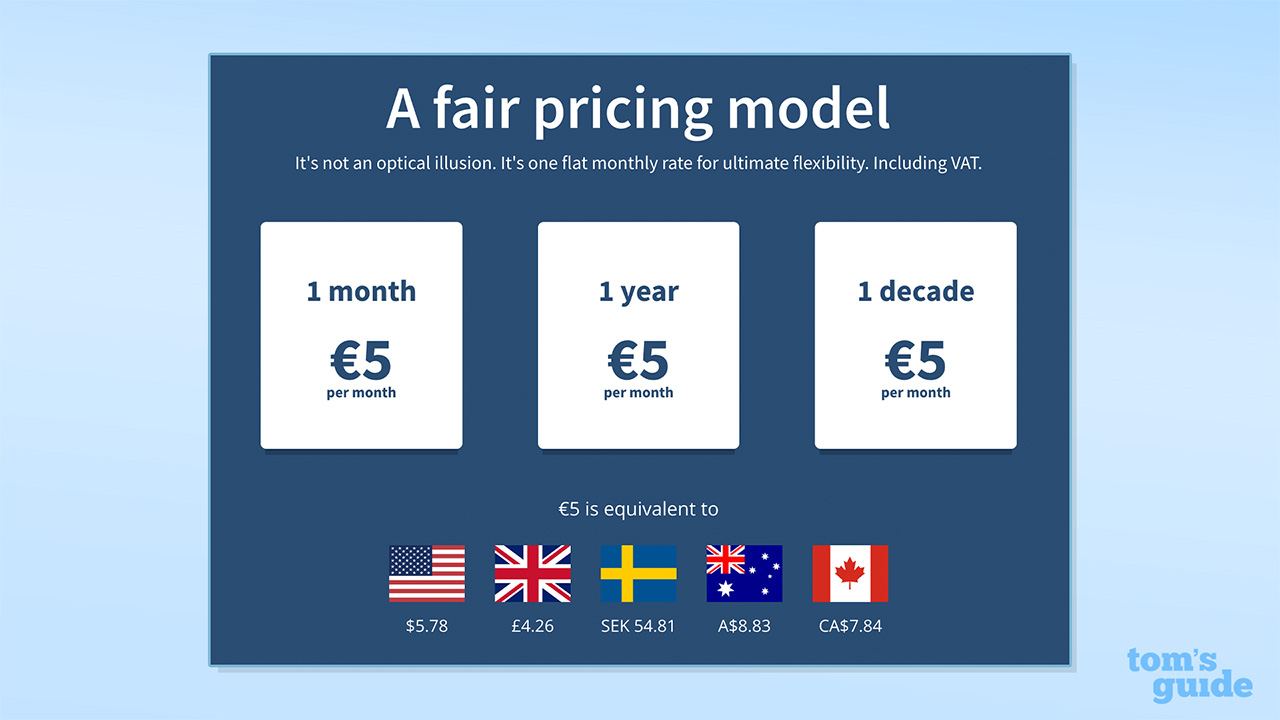
How to save money on VPN renewals
So, I've told you all the ways in which VPN companies are trying to charge you more than you expect for their services. But what can you do about it?
Well, it's actually quite easy.
The first thing to do is to make sure that a button called "auto-renewal" (or similar) is set to "off" in your VPN account. This means you're withdrawing your consent for the VPN company to charge your card when your plan runs out. If you can't find it for your particular VPN, just give it a Google – it legally needs to be there.
Be aware that these renewal charges are often made up to two weeks before your plan actually expires, so best practice is to switch it off as soon as you subscribe.
If you do want to stay with your VPN provider, all you need to do is claim another introductory deal.
Head to the website that is offering the best deal and claim your introductory price again. You may have to use a fresh email address – although this is often unnecessary – but it's well worth it to save a hefty wad of cash on your VPN subscription.
Some VPNs – like NordVPN and Surfshark – allow you to buy extra months this way and tack them onto your existing plan.
Now, promise me you've unticked that auto-renew checkbox...
We test and review VPN services in the context of legal recreational uses. For example: 1. Accessing a service from another country (subject to the terms and conditions of that service). 2. Protecting your online security and strengthening your online privacy when abroad. We do not support or condone the illegal or malicious use of VPN services. Consuming pirated content that is paid-for is neither endorsed nor approved by Future Publishing.

Mo has been rigorously testing, reviewing, and analyzing VPN services at Tom’s Guide for more than five years. He heads up the three-person Tom's Guide VPN team, and is passionate about accessibility: he believes that online privacy should be an option that’s available to everyone. NordVPN and ExpressVPN are the products he uses most on a daily basis, but he experiments weekly with all the top services, evaluating their privacy features, connection speeds across various protocols, and server reliability – among other things – so that he can make confident VPN recommendations that are backed by data. To see his latest advice, head over to Tom’s Guide’s best VPN and best free VPN guides.
You must confirm your public display name before commenting
Please logout and then login again, you will then be prompted to enter your display name.
 Club Benefits
Club Benefits





